This course has now finished. If you are interested in keeping bees, please contact Richard Simpson, course organiser, see telephone and email address below.
Some of the 2024 Beginners enjoying their first apiary session on a beautiful, sunny afternoon.
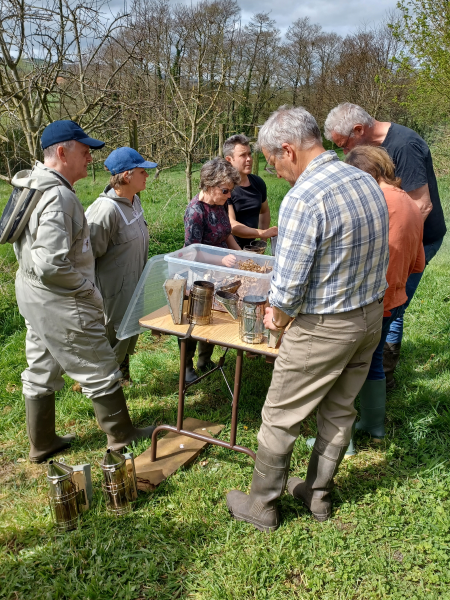
Lighting smokers
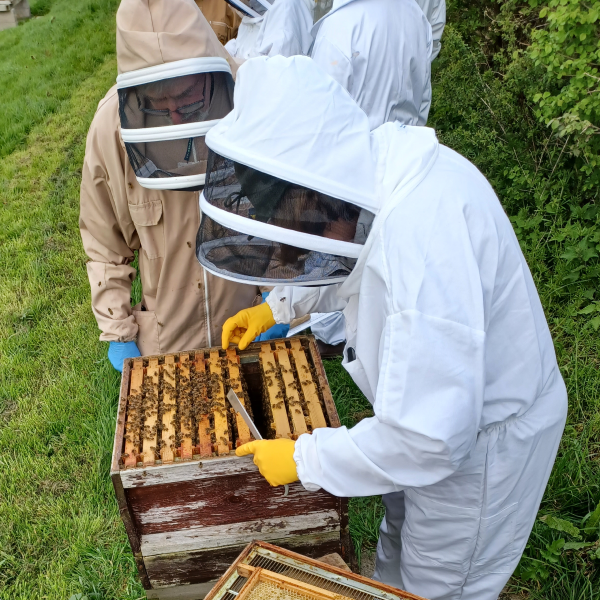
Opening hives
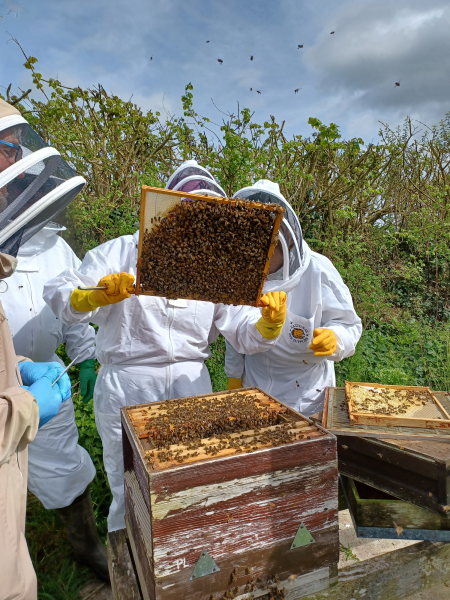
Examining comb
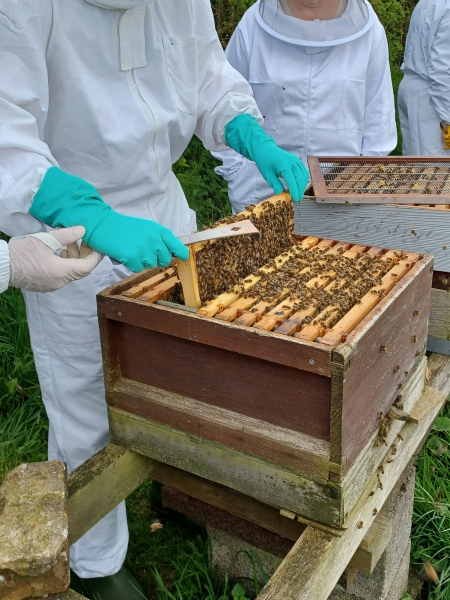
Lifting frames…
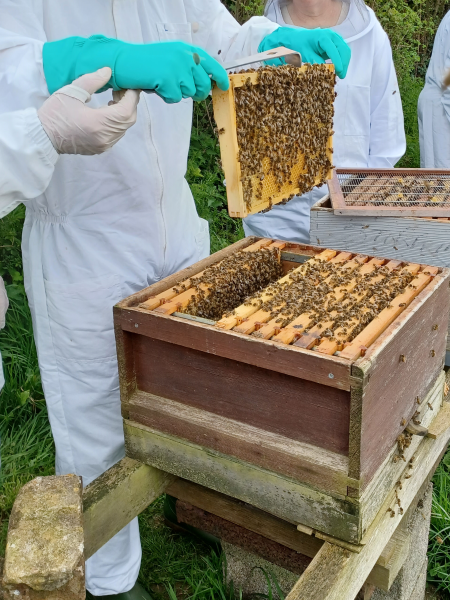
viewing 1st side…
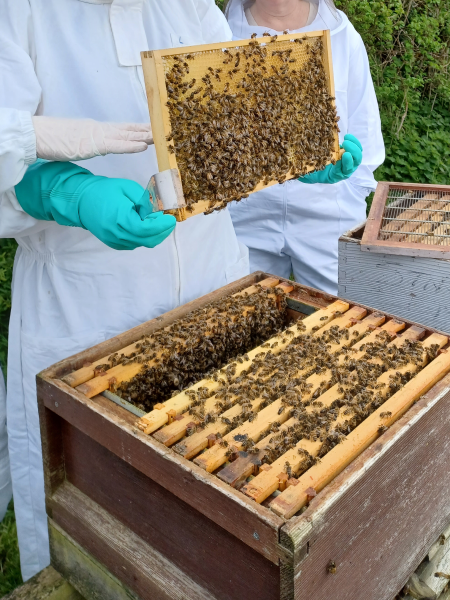
viewing 2nd side
Beekeeping for Beginners Course.
East Devon Branch of Devon Beekeepers’ Association
Full tuition, practical experience and mentor support to help you get started.
Participants will be taken through the beekeeping fundamentals at our ‘Bee Shed’ at Hunthay near Axminster prior to the active season, which begins in April. Practical tuition under expert guidance will follow, allowing you to apply the theory to live bees.
Local mentors and instruction in our club apiary will put you in the best position to develop your skills and knowledge.
The cost of the course for 2024 will be £100 per person with a reduction for partners of £50.
Course dates:
| Activity | Date | Time |
|---|---|---|
| Start theory | Sat 3rd February | 10:00am – 12:00pm |
| Week 2 | Sat 10th February | 10:00am – 12:00pm |
| Week 3 | Sat 17th February | 10:00am – 12:00pm |
| Week 4 | Sat 24th February | 10:00am – 12:00pm |
| Week 5 | Sat 2nd March | 10:00am – 12:00pm |
| End theory | Sat 9th March | 10:00am – 12:00pm |
| Practical. 1st Group, or, | Sat 16th March | 10:00am – 12:00pm |
| Practical. 2nd Group | Sat 23rd March | 10:00am – 12:00pm |
| Beginners 1st apiary practical | Sat 6th April | 10:00am – 12:00pm |
| Regular apiary sessions | Sat 13th April and continuing | 2.30pm – 4.30pm |
Theory and practical sessions take place at ‘The Bee Shed’, Hunthay apiary, EX13 5RJ
Included in the fee are:
- Your subscription to Devon Beekeepers’ Association,
- Your subscription to the national organisation, British Beekeepers’ Association,
both of which produce regular colour magazines.
Further benefits include:
- insurance,
- use of club equipment and facilities,
- attendance at events, talks and advice sessions,
- access to equipment sales when available,
- the club library,
- local newsletters AND
- a copy of Haynes Beekeeping Manual for you to keep and refer to in the years to come.
If you would like to be emailed the syllabus (when available), plus a subscription form, please send your details to Richard Simpson (see below). Places are limited and will be reserved in order of date of application. Your place will then be confirmed upon receipt of your subscription.
Please note: When it comes to the theory part of our Beginners course held in the classroom, we ask that Junior members need to be a minimum of secondary school age in order to assimilate and understand the material presented.
Course Coordinator: Richard Simpson, 07900 492 242, education@edbk.co.uk, who will be happy to answer any questions.
The Cake Baking Competition 2024
With each new group of beginners we hold an informal competition to bake a Honey Cake, to be judged as if it were entered into the Baking Section at a local Honey Show.
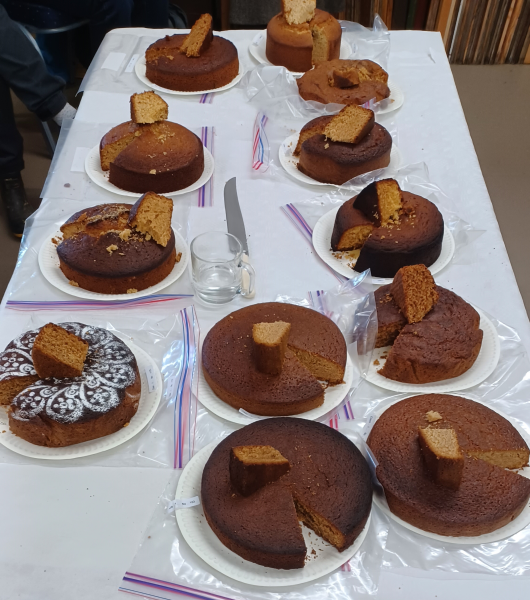
Baking a Honey Cake provides a challenge, even to experienced cooks, as the inclusion of honey tends to make the cake darken very easily. The cakes should be make as follows:
Ingredients
5 oz /140g butter
6 oz /170g clear honey
4 oz / 110g soft brown sugar
2 eggs
7 oz / 200g self raising flour
1 tablespoon water or milk
Method
- Place butter, sugar, honey and water into a saucepan and heat until the fat has melted, stirring all the time.
- Remove the pan from the heat and allow contents to cool to blood temperature.
- Gradually beat in the eggs.
- Add sieved flour and mix until smooth. Do not over-mix.
- Pour the mixture into a greased and lined 7″- 8″ round cake tin (175-200mm) and bake for about 1 hour until risen and firm to the touch. As a guide, oven temperature 350°F/Mark 4/180°C.
Tips
Stick to the schedule. Ignore the temptation to spice it up with raisins, icing, ginger or whatever.
Honey browns quicker than sugar. Useful for browning, say chicken wings but, it can soon appear dark-verging-on-burnt.
Honey contains water, typically c. 17-18%, so be cautious about making the mixture too wet.
Honey cooks quite slowly, so try to make sure it is cooked through, but not dry or burnt. You cannot take out a section to see. The Judges will do that.
Cracking is not fatal. Taste and aroma outweigh minor cracks, but a ‘smiling’ cake will lose to a perfect top if other factors are equal.
A honey cake should taste and smell of honey. A stronger flavoured honey (usually that means a darker honey) imparts more ‘kick’ to the cake than a light honey, but some can be a bit too strong when cooked. Heather imparts a good, strong flavour, but is not easy to find outside heather areas and is quite expensive. You may use any honey and make as many trial cakes as you wish.
We are not responsible for your figure!
And the winners are…
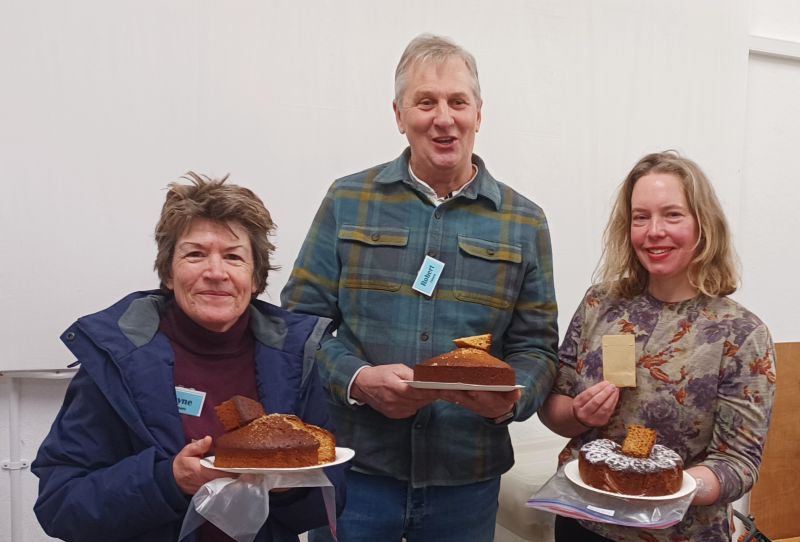
Thanks to our Honey Judges Kath West and Helen Bithrey. It’s a tough job, having to taste all those cakes!